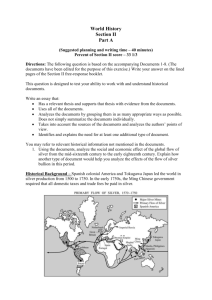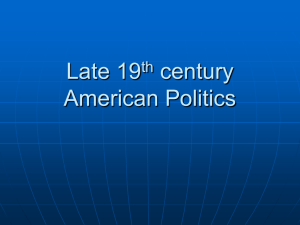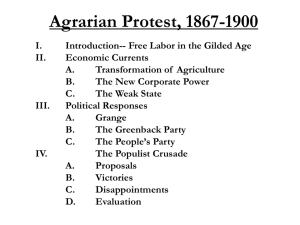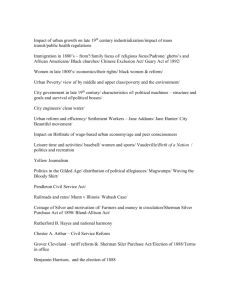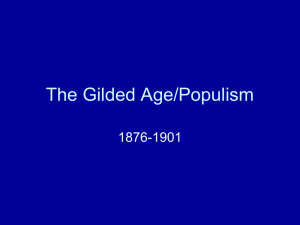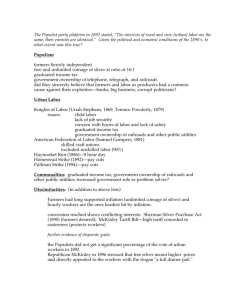901. Dawes Severalty Act, 1887 Also called the General Allotment
advertisement
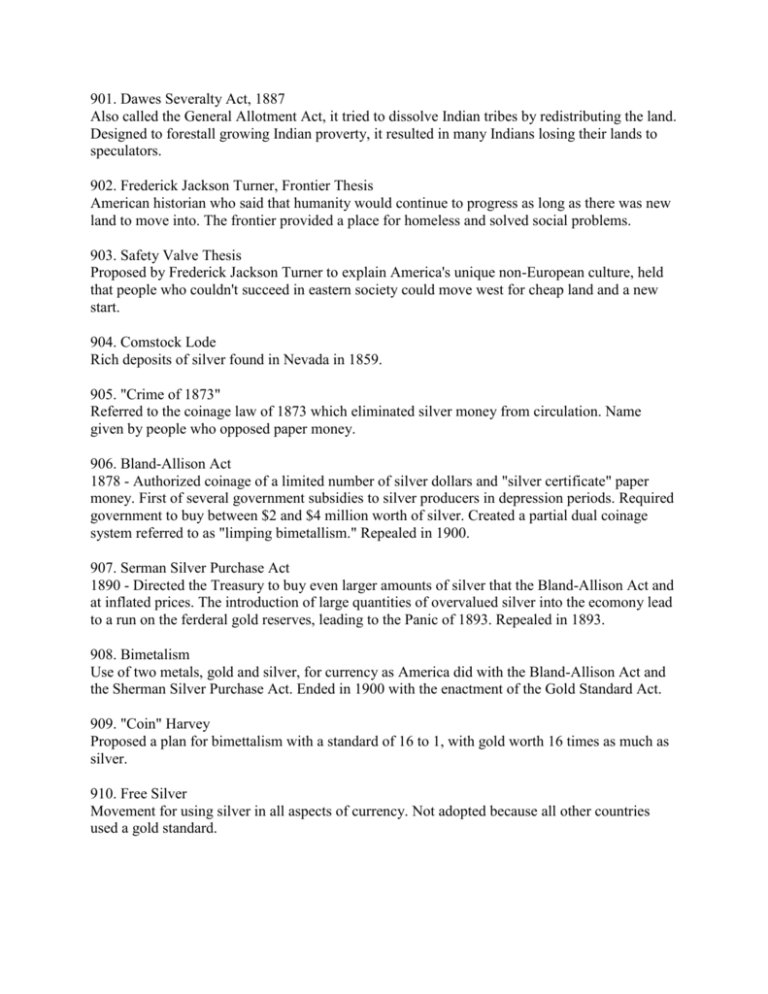
901. Dawes Severalty Act, 1887 Also called the General Allotment Act, it tried to dissolve Indian tribes by redistributing the land. Designed to forestall growing Indian proverty, it resulted in many Indians losing their lands to speculators. 902. Frederick Jackson Turner, Frontier Thesis American historian who said that humanity would continue to progress as long as there was new land to move into. The frontier provided a place for homeless and solved social problems. 903. Safety Valve Thesis Proposed by Frederick Jackson Turner to explain America's unique non-European culture, held that people who couldn't succeed in eastern society could move west for cheap land and a new start. 904. Comstock Lode Rich deposits of silver found in Nevada in 1859. 905. "Crime of 1873" Referred to the coinage law of 1873 which eliminated silver money from circulation. Name given by people who opposed paper money. 906. Bland-Allison Act 1878 - Authorized coinage of a limited number of silver dollars and "silver certificate" paper money. First of several government subsidies to silver producers in depression periods. Required government to buy between $2 and $4 million worth of silver. Created a partial dual coinage system referred to as "limping bimetallism." Repealed in 1900. 907. Serman Silver Purchase Act 1890 - Directed the Treasury to buy even larger amounts of silver that the Bland-Allison Act and at inflated prices. The introduction of large quantities of overvalued silver into the ecomony lead to a run on the ferderal gold reserves, leading to the Panic of 1893. Repealed in 1893. 908. Bimetalism Use of two metals, gold and silver, for currency as America did with the Bland-Allison Act and the Sherman Silver Purchase Act. Ended in 1900 with the enactment of the Gold Standard Act. 909. "Coin" Harvey Proposed a plan for bimettalism with a standard of 16 to 1, with gold worth 16 times as much as silver. 910. Free Silver Movement for using silver in all aspects of currency. Not adopted because all other countries used a gold standard. 911. Depression of 1893 Profits dwindled, businesses went bankrupt and slid into debt. Caused loss of business confidence. 20% of the workforce unemployed. Let to the Pullman strike. 912. Coxey's army 1893 - Group of unemployed workers led by Jacob Coxey who marched from Ohio to Washington to draw attention to the plight of workers and to ask for government relief. Government arrested the leaders and broke up the march in Washington. 913. Repeal of Serman's Silver Purchase Act 1893 - Act repealed by President Cleveland to protect gold reserves. 914. Farmer's Alliance Movement which focused on cooperation between farmers. They all agreed to sell crops at the same high prices to eliminate competition. Not successful. 915. Ocala Demands 1890 - The leaders of what would later become the Populist Party held a national convention in Ocala, Florida and adopted a platform advocating reforms to help farmers. 916. Populist Party platform, Omaha platform Offically named the People's Party, but commonly known as the Populist Party, it was founded in 1891 in Cincinnati, Ohio. Wrote a platform for the 1892 election (running for president-James Weaver, vice president-James Field) in which they called for free coinage of silver and paper money; national income tax; direct election of senators; regulation of railroads; and other government reforms to help farmers. The part was split between South and West. 917. Tom Watson A leader of the Populist Party in the South. 918. James B. Weaver He was the Populist candidate for president in the election of 1892; received only 8.2% of the vote. He was from the West. 919. "Pitchfork" Ben Tillman A senator from South Carolina, he compared Cleveland's betrayal of the Democratic party to Judas' betrayal of Jesus. 920. Mary Ellen Lease A speaker for the Populist Party and the Farmer's Alliance. One of the founders of the Populist Party. 921. "Sockless" Jerry Simpson A rural reformer who ran against Mary Lease in the Populist Part election in Kansas. 922. Ignatius Donnely A leader of the Populist Party in Minnesota. 923. Williams Jenning Bryan Three-time candidate for president for the Democratic Party, nominated because of support from the Populist Party. He never won, but was the most important Populist in American history. He later served as Woodrow Wilson's Secretary of State (1913-1915). 924. "Cross of Gold" Speech Given by Bryan on June 18, 1896. He said people must not be "crucified on a cross of gold", referring to the Republican proposal to eliminate silver coinage and adopt a strict gold standard. 925. Election of 1896: candidates and issues William McKinley-Republican, North, industry and high tariffs. Williams Bryan-Democrat, West and South, farmers and low tariffs. The main issues were the coinage of silver and protective tariffs. 926. Marcus Hanna Leader of the Republican Party who fought to get William McKinley the Republican nomination for president. 927. Gold Standard Act 1900 - This was signed by McKinley. It stated that all paper money would be backed only by gold. This meant that the government had to hold gold in reserve in case people decided they wanted to trade in their money. Eliminated silver coins, but allowed paper Silver Certificates issued under the Bland-Allison Act to continue to circulate. 928. Supreme Court cases Legal Tender cases, Minor vs. Happensett, Wabash, St. Louis & Pacific Railroad Company v. Illinois, E. C. Knight Company case, Pollock v. Farmer's Loan & Trust Company, and In Re Debs. 929. Supreme Court: Legal Tender cases 1870, 1871 - A series of cases that challenged whether the paper "greenbacks" issued during the Civil War constituted legal tender, i.e., whether they were valid currency. The Supreme Court declared that greenbacks were not legal tender and their issuance had bee unconstitutional. 930. Supreme Court: Minor v. Happensett 1875 - Limited the right to vote to men. 931. Supreme Court: Wabash, St. Louis & Pacific Railroad Company v. Illinois 1886 - Stated that individual states can control trade in their states, but cannot regulate railroads coming through them. Congress has exclusive jurisdiction over interstate commerce. States cannot regulate or place restrictions on businesses which only pass through them, such as interstate transportation. 932. E. C. Knight Company case 1895 - The Supreme Court ruled that since the Knight Company's monopoly over the production of sugar had no direct effect on commerce, the company couldn't be controlled by the government. It also ruled that mining and manufacturing weren't affected by interstate commerce laws and were beyond the regulatory power of Congress. It gave E. C. Knight a legal monopoly because it did not affect trade. 933. Pollock v. Farmer's Loan and Trust Company 1895 - The court ruled the income could not be taxed. In response, Congress passed the 16th Amendment which specifically allows taxation of income (ratified 1913). 934. In Re Debs 1894 - Eugene Debs organised the Pullman strike. A federal court found him guilty of restraint of trade, stopping US mail, and disobeying a government injunction to stop the strike. He later ran for president as a candidate of the Social Democratic Party. 935. James G. Blaine, Pan-Americanism The 1884 nomination for the Rebublican presidential candidate. Pan-Americanism stated that events in the Americans affected the U.S. and we thus had reason to intervene. 936. Venezuelan boundary dispute Dispute between the U.S. and Britain involving the point at which the Venezuela / Columbia border was drawn. Britain eventually won the dispute. 937. Bering sea seal controversy A dispute between the U.S. and Russia involving who could hunt seals in the Bering Sea. 938. "Yellow journalism" Term used to describe the sensationalist newspaper writings of the time. They were written on cheap yellow paper. The most famous yellow journalist was William Randolf Hearst. Yellow journalism was considered tainted journalism - omissions and half-truths. 939. Josiah Strong, Our Country In this book, Strong argued that the American country and people were superior because they were Anglo-Saxon. 940. Captain Alfred Thayler Mahan In 1890, he wrote The Influence of Sea Power upon History. He was a proponent of building a large navy. He said that a new, modern navy was necessary to protect the international trade America depended on. 941. Pago Pago, Samoa 1878 - The U.S. gained the strategic port Pago Pago in Samoa for use in refueling U.S. warships overseas. It was part of building an international military presence. 942. Virginius 1873 - Spain and U.S. government got into a squabble over the Cuban-owned Virginius, which had been running guns. Spain executed several Americans who had been on board. The telegraph was used to negotiate a truce. The incident was played up by the yellow journalists. 943. Reconcentration Policy When Cubans started to rebel, Spaniards begain to reorganize prisoners into labor camps. 944. De Lome Letter Written by the Spanish minister in Washington, Dupuy de L�me, it was stolen from the mail and delivered to Hearst. He had called McKinley weak and bitter. It was played up by the yellow journalists. 945. Maine explodes February 15, 1898 - An explosion from a mine in the Bay of Havanna crippled the warship Maine. The U.S. blamed Spain for the incident and used it as an excuse to go to war with Spain. 946. Assistant Secretary of Navy Theodore Roosevelt In charge of the navy when the Maine crisis occurred, he had rebuilt the navy and tried to start a war with Cuba. 947. Commodore Dewey, Manila Bay May 1, 1898 - Commodore Dewey took his ship into Manila Bay, in the Philippine Islands, and attacked the Spanish Pacific fleet there. The U.S. had been planning to take this strategic port in the Pacific. Dewey caught the Spanish at anchor in the bay and sank or crippled their entire fleet. 948. Cleveland and Hawaii President Cleveland did not want to forcibly annex Hawaii, so he waited five years to do so. McKinley finally did it. Cleveland felt the annexation overstepped the federal government's power. 949. Queen Liliuokalani Queen of Hawaii who gave the U.S. naval rights to Pearl Harbor in 1887. Deposed by American settlers in 1893. 950. Annexation of Hawaii By the late 1800s, U.S. had exclusive use of Pearl Harbor. In July 1898, Congress made Hawaii a U.S. territory, for the use of the islands as naval ports.
